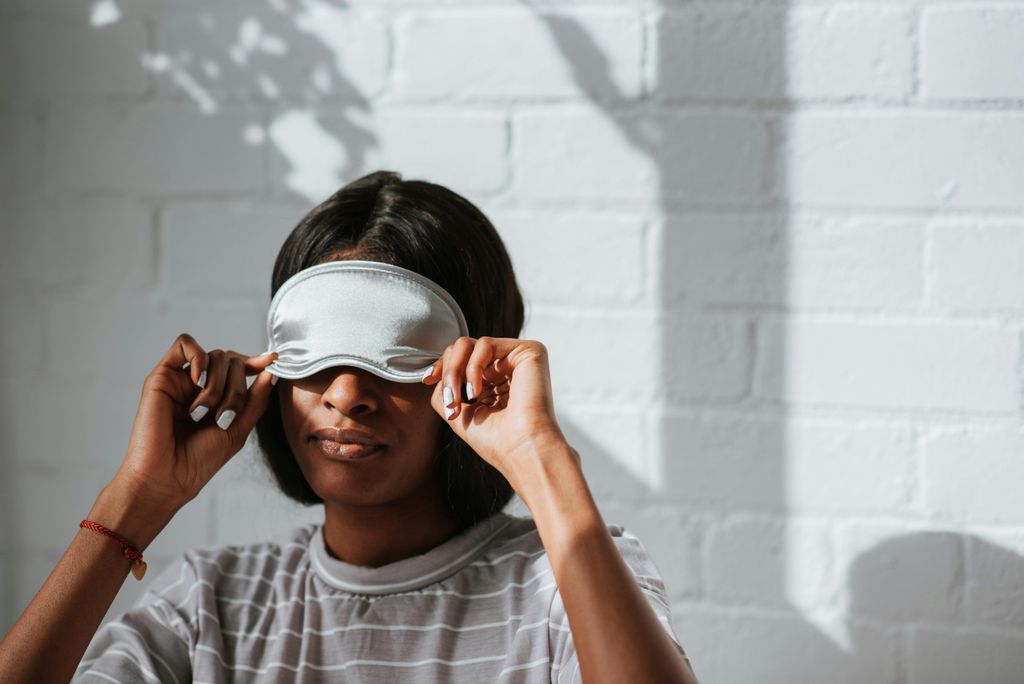What Are Circadian Rhythms? How To Get Quality Sleep & Blue Light Blocking Glasses

Every day that you walk the earth, you are governed by something called circadian rhythms. Some people are completely unaware of these rhythms and how they impact their life, so taking time to understand this is a wise move.

Circadian rhythms have a very large influence on the quality and amount of sleep you get on a day-to-day basis and sleep is a huge dictator in your overall health.
If you are not sleeping enough on a nightly basis, it can lead to a number of health-related issues including poor heart health, excessive weight gain, poor blood sugar response, stroke, mental health issues, as well as poor concentration level and ability to stay focused.
The good news is that once you know more about this, you can then optimize your habits so that you are getting the quality of sleep that you desire.
Check out the following video for a primer on circadian rhythms and some of the best techniques, including blue light-blocking glasses used to help manage yours.
What Are Circadian Rhythms?
First, let’s go over what circadian rhythms are so that you can fully understand this concept before talking about how to optimize your sleep quality.
Circadian rhythms are physical, mental, and behavioral changes that occur over a 24-hour cycle. Every day, you move forward through these changes automatically.
Think of it as a programming system that your entire body runs off of. Every day at 6 am, certain things take place. At noon, other things are occurring, and at 10 pm as you start getting ready for bed, other changes take place.
Just For You: Get the 12 Week To Doubling Your Energy course for FREE right now and find out exactly what you can be doing to set up the perfect nightly routine.[sc name=”end-alert” ]
While the things that you do on a day-to-day basis can have some slight influence over your natural circadian rhythms, you can never entirely change them as it is pre-programmed into your body at birth.
What governs circadian rhythms? Light exposure is the biggest factor dictating all the events that occur with your circadian rhythms. This is why circadian rhythms were so important in ancient times before electricity was invented. Back in those days, they didn’t have alarm clocks to wake them up to start getting ready for a day of work. Instead, they relied on their body’s instincts, or as you’ll come to see, the influence of light.
Circadian rhythms exist in almost all living things, so this is not specific to humans only. They exist in animals, plants, and even the tiniest of microbes that live on the planet.
The study of this all is called chronobiology, and scientists are always discovering more ways in which circadian rhythms impact us.
Now, one thing that must be pointed out is that a circadian rhythm is not the same as a biological clock. You may have heard the term biological clock used before to refer to natural processes the body goes through across time.
Biological clocks are going to drive your circadian rhythms as you’ll notice that as you get older, which is an influence of your biological clock, this can impact your circadian rhythms.
This is one reason why many older individuals start waking up much earlier in the morning. Their natural circadian rhythm has started to shift thanks to their biological clock, which governs it.
Your biological clock can be defined as the innate mechanism that controls the physiological activities that change on a daily, seasonal, yearly, or any other regular cycle.
So think of your circadian rhythm as being under your biological clock.
At the top of this, heading all your clocks, is your ‘master clock’, a group of nerve cells in the brain that are referred to as the SCN (suprachiasmatic nucleus). These nerve cells are housed in the hypothalamus in the brain and are very numerous in numbers, coming in at nearly 20,000 nerve cells.
Now that you know more about circadian rhythms, let’s talk about how they impact your body.
How Circadian Rhythms Impact Your Health
The biggest factor that your circadian rhythm has on the body is with regard to your sleep/wake cycles. As light plays a big role in regulating your circadian rhythms, it signals to the body to start waking up as morning arrives and, likewise, signals to the body that it’s time to start getting sleepy as it begins to get dark outside.
If you ever find that you struggle to sleep well during the summer months but have no problem sleeping during the winter months, it could be this that’s causing this difference to occur.
As natural daylight hours are much longer during the summer months (hence the sun stays out longer in the evening and doesn’t rise until much later during the day), this can impact the quality of sleep you get. Shortly we will go over ways to counteract this, however.
You’ll find that, generally speaking, your strongest internal drive to sleep is between the hours of 2 am and 4 am in the morning. This is one big reason why shift workers can suffer from so many health woes. They are constantly fighting what their body is naturally trying to do, forcing themselves to sleep at different times when their body naturally wants to be awake and then trying to stay awake when the body would naturally want to be sleeping.
It’s also interesting to note that a shift in circadian rhythm typically occurs during the teenage years. This shift causes teenagers to feel much more awake during the evening hours, hence why many teens struggle to go to bed on time and equally struggle with waking up early in the morning to go to school. Some teens are hit harder than others by this, as there is some component of your circadian rhythm that is genetically programmed.
Because sleep is so related to several bodily processes that occur, your circadian rhythm will also impact you in other ways as well.
For instance, your circadian rhythm will impact the hormonal release that takes place in the body. Cortisol, for instance, tends to rise very early in the morning and then will slowly decrease as the day goes on. Insulin sensitivity also follows a natural 24-hour cycle as well, with studies illustrating that glucose tolerance and insulin responses to glucose and meals are higher in the morning than at night.
Get It Now: Get the 12 Week To Doubling Your Energy course for FREE right now and learn how you can combat diseases like heart disease and diabetes head-on.
Knowing this information can then become helpful when designing a diet to help you feel optimal throughout the day. And, for those who are suffering from diabetes, it’s very important information to help them better manage their blood glucose throughout the day.
Likewise, your circadian rhythm also influences the production of a hormone called melatonin in the body as well. Melatonin is a hormone that is produced in the pineal gland that helps to cause you to feel drowsy during the evening and can help wake you up during the morning hours.
Melatonin cannot be made when light is being processed by the brain, so if you wake up and see bright lights, you may struggle to go back to sleep. Once the melatonin production stops, your brain will want to stay awake as it’s no longer getting this drive to sleep as it should.
Here again, this is one way the warmer, sunnier months can make it harder for you to fall asleep.
Another way in which your circadian rhythm impacts you is through temperature regulation. Your temperature will naturally decrease as you begin sleeping, and, as such, you will notice a rise upon waking in the morning. Your temperature will then continue to increase as the day progresses until the early evening when it will start to decrease naturally in preparation for sleep.
So as you can see, your circadian rhythm is going to influence many processes that take place in your body. You may not have been aware of this before, but it’s important to know going forward.
How To Get Quality Sleep
By now, hopefully, you understand the importance of sleep. Of all things that you could do to improve your health quality, getting enough sleep ranks right up there in the top spot.
Depending on the lifestyle decisions you make, you can either help improve your sleep or take away from it.
Here’s what you need to know to optimize sleep through your natural circadian rhythm.
Set Regular Bed-Times
The very first must-do if you are going to improve your sleep is to set regular bedtimes. As hard as it may be to go to bed and wake up at the same time each night if you want to achieve optimal results in terms of feeling your best all the time, it’s a must.
This helps your body get used to falling asleep at a certain hour and waking up, making it easier to do so each and every night.
If you stay up until 2 am on the weekends, you’re going to find that come Sunday night, it gets very hard to go to bed at 10 pm to get up at 6:30 or whenever you awaken for work the next morning.
Keeping a regular schedule, as much as possible, is vital to success. Again, this is where shift workers can struggle. If they are working opposite shifts as the week goes on, they constantly have that fluctuating schedule that will hinder them from ever getting into a normal routine.
At the very least, if you have to take a job that has you working non-traditional hours, keep those hours consistent so that you are still sleeping at the same time each day.
The more routinized you can make your sleep schedule, the better.
Turn Off All Electronics Before Bed
Another must-do if you are going to help yourself fall asleep faster and learn how to get quality sleep is to turn off all electronics before bed. This includes computers, iPads, iPhones, and even televisions (as much as you may hate to do this!).
Those who use these devices in the late hours of the evening are being exposed to light that’s highly stimulating for the brain and can make it hard to fall asleep.
If you are burning the midnight oil working on your computer, for instance, you might find that when you finally do go to lay down to sleep, you really struggle to do so. Your brain is ‘wired,’ so to speak, from all that bright light you have been taking in.
Making the last few hours before you go to bed an electronics-free zone can be a great decision in terms of improving your overall sleep quality.
Turn Off Wi-Fi
Which now brings us to another thing you’ll want to strongly consider if you are hoping to see optimal sleep patterns: turning off the wi-fi in your house and especially your bedroom.
One big mistake that many people make is going to sleep with their cell phones sitting right beside their heads. Even though they may not be looking directly into the screen, thus experiencing those bright lights that keep them awake, the bigger issue with this is that the Wi-Fi signals that are being sent to and from that phone can interfere with the natural rest of the brain, making it both harder for you to fall asleep and resulting in lower quality sleep when you do finally get that shut-eye you need.
If you are going to have your cell phone in your bedroom with you as you sleep (as many people do plug it in to recharge it and use it as an alarm clock), you’ll want to make sure that you put it on airplane mode, so no signals are coming to and from that phone.
Free Download: Get the 12 Week To Doubling Your Energy course for FREE right now and discover how the signals from your electronics could be harming your health.[sc name=”end-alert” ]
This will not only produce a better quality of sleep but is also a safer choice, so you are not exposed to those signals for 8 hours straight every single night.
Consider Blue Light Blocking Glasses
A great investment you can make if you really want to take your sleep to the next level is to invest in some blue light-blocking glasses. These glasses are designed to help block out the light spectrum that, helps to stimulate the brain, and can cause you to feel more awake than you otherwise would be.
These glasses are great to wear a few hours prior to going to bed and can be excellent for inducing a level of sleepiness that you otherwise would not achieve.
Blue light glasses are a must for anyone who is struggling to sleep soundly at night and who may be tossing in turning all night long, laying awake because they feel as though their brain won’t shut off.
Putting these glasses on while also avoiding the light from electronics will give you the absolute best of both worlds.
Purchase A New Mattress
Finally, the last must-do to ensure you get sufficient sleep is to invest in a good quality mattress. This is one that too many people completely take for granted but one that can make such a huge difference, so it must be paid attention to.
You’ll find many people spending thousands of dollars on cars, vacations, and other items, but yet, on something they sleep on about a third of their life, they cheap out.
And a mattress can make a significant difference in the quality of sleep you get, especially if you are sleeping with a significant other.
One thing that many people forget about is that mattresses do wear out. So while you may have initially invested in a good one, if you haven’t changed it in the last ten years, it’s likely time to get a new one.
On average, a good, high-quality mattress should last for around 9-10 years and after that, consider it expired. If you purchased a cheaper one initially and bought a lower-quality one, you’ll likely be looking at having to change it after five to seven years.
A good guide to needing a new mattress is how you are sleeping. If you awaken a lot during the night (not to use the bathroom or for other reasons), that’s a good sign that you may be in need of a new mattress.
When shopping for a mattress, the best ones to look at are those that come with memory foam. When looking at sleep satisfaction surveys, these are the ones that rank the highest and will give you the best night’s rest.
Plus, if you sleep with a significant other and they come to bed later than you (or tosses and turn next to you), you won’t be near as disturbed by them.
Frequent awakenings during the night are one of the biggest causes of waking up feeling unrested, so you want to minimize this as much as possible.
The only caveat to know about memory foam mattresses is that they can be a bit warmer to sleep on, so you’ll also want to be sure that you have access to a fan or air conditioner. Being too hot can also rob you of good sleep; you want to do all you can to minimize feeling this way.
So there you have the key tips and tricks you should implement to ensure you get the highest quality of sleep possible. You have built-in body tendencies that want you to sleep at certain night hours, so you need to start listening to those and working with them rather than against them.
If you apply the tips we’ve discussed, you should notice a significant improvement in your sleep quality.
Do you have any sleep tips or tricks to share? What’s helped you get a good night’s sleep? Comment below.
References:
Boden, G.U.E.N.T.H.E.R., et al. “Evidence for a circadian rhythm of insulin secretion.” American Journal of Physiology-Endocrinology And Metabolism 271.2 (1996): E246-E252.
1 Comments
Leave a Comment
You must be logged in to post a comment.




Where are the promised links for the orange glasses and light? I could not find them.